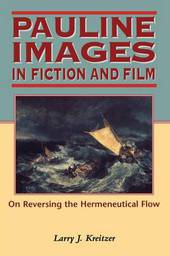
|
Pauline Images in Fiction and Film: On Reversing the Hermeneutical Flow
Paperback / softback
Main Details
| Title |
Pauline Images in Fiction and Film: On Reversing the Hermeneutical Flow
|
| Authors and Contributors |
By (author) Larry Joseph Kreitzer
|
| Series | Biblical Seminar |
|---|
| Physical Properties |
| Format:Paperback / softback | | Pages:241 |
|
| Category/Genre | Literary theory
Literary studies - general
Christianity |
|---|
| ISBN/Barcode |
9781850759331
|
| Classifications | Dewey:809.9338227 |
|---|
| Audience | | Undergraduate | | Postgraduate, Research & Scholarly | |
|---|
|
Publishing Details |
| Publisher |
Bloomsbury Publishing PLC
|
| Imprint |
Sheffield Academic Press
|
| Publication Date |
1 March 1999 |
| Publication Country |
United Kingdom
|
Description
Here Dr Kreitzer explores the connections between biblical texts, classic works of literature, and cinematic interpretations of those works. The aim is to illuminate both the New Testament texts and facets of contemporary culture through a cross-disciplinary approach. This volume contains studies of Daniel Defoe's Robinson Crusoe, Oscar Wilde's The Picture of Dorian Gray, Bram Stoker's Dracula, and Harriet Beecher Stowe's Uncle Tom's Cabin, all of which are set against the backdrop of images drawn from the Pauline epistles. The studies discuss a wide variety of theological themes, including shipwreck and salvation, eschatology, eucharistic imagery, and liberation and slavery.
Author Biography
Larry J Kreitzer is Tutor for Graduates and Tutor of New Testament at Regent's Park College, Oxford. He also holds a Research Lectureship within the Faculty of Theology in Oxford. He is the author of several books, including The Letter to the Ephesians (Epworth Commentary, 1997), Pauline Images in Fiction and Film (1999), and Gospel Images in Fiction and Film (2002).
ReviewsBook Review ~ Recensioner, SEA 69,2004 "...I think within him [Kreitzer] there is an adventurous spirit that challenges all hermeneuticists to explore the essential role of myth in our lives...[T]he greatest contribution of Larry J. Kreitzer is highlighting the interpretative process as it unfolds between writer and film maker. This relationship makes me subtly aware of audience, authorial intent, tradition, and Near Eastern culture in the study of Biblical literature. The author is aware that traditional religious concepts grew out of the need to understand the deeper meanings of life and I think that he is doing us all a big favor by challenging us not to put God in a box, separate from the rest of life." -Religious Education, Spring 2003 -- Liam Logue * Religious Education *
|